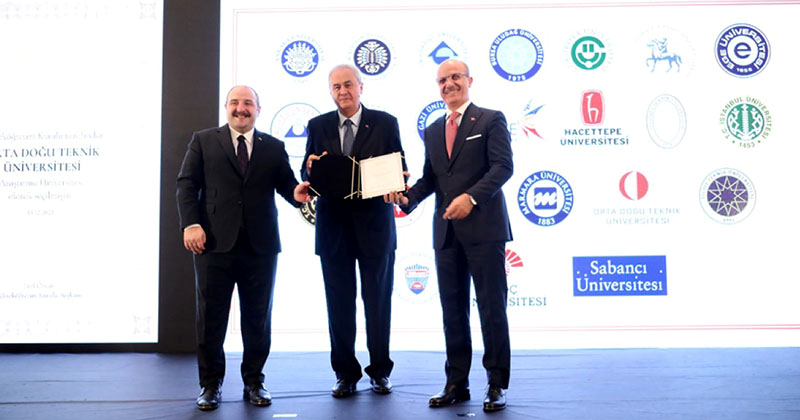
METU Ranks First Among Research Universities Once Again!
The Middle East Technical University has ranked first in the "Research Universities Performance Monitoring Index," which evaluates the performances of the universities included in the "Mission Differentiation and Specialization on the Basis of Research Program" carried out by The Council of Higher Education (YÖK) within the scope of their project titled "Mission Differentiation and Specialization in Higher Education." In the list that has been annually announced for the last four years since 2017, METU has retained its position in the first place with 85,4 points according to the evaluation results of the performances in the year 2020.

In the Research Universities Performance Monitoring Index, performances of the research universities in 2020 were evaluated according to 32 indicators under the titles "Research Capacity," "Research Quality," and "Interaction and Cooperation." Just as in the performance evaluations for 2017, 2018, and 2019, METU received the highest score this year once again, thus ranking first for four years in a row.
With the new regulations made by YÖK in the "Mission Differentiation and Specialization on the Basis of Research" Program, research universities were divided into three performance groups as A1, A2, and A3, including candidate research universities, as well. In the new system, the performances of research universities will be observed on a regular basis by the Monitoring and Evaluation Committee, established within YÖK, and the type of supports planned to provide to the research universities will differ according to the performance group of the university. In this new classification system, the Middle East Technical University was included in the A1 (universities with high-level research performance) group, in which there are three research universities with the highest performance.
In the performance evaluation for 2020, the criteria evaluated under the "Research Capacity" category, which constitutes 25 percent of the total score, are as follows: the number of scientific publications in the university, the number of citations, number of national projects, the amount of funds obtained from national and international projects, the number of national and international patent applications, the number of national and international patent documents, the number of utility models/industrial design documents, the number of doctoral students, and the number of individuals who received their doctoral degree from the university.
The criteria taken into account under the "Research Quality" title, which constitutes 40 percent of the total score, include the ratio of scientific publications that are in the 50% group of journal impact factor according to Incites, the ratio of scientific publications that are in the 10% group of journal impact factor according to Incites, the number of national science awards, the number of companies founded by the faculty members of the university, the number of companies founded by the students/alumni of the university, the number of students granted with YÖK 100/2000 PhD Scholarship Program, the number of students within TÜBİTAK 2244 Industrial PhD program, the amount of funds received within TÜBİTAK 1004 Technology Platform Project, the open access percentage of scientific publications, the open access percentage of theses, the number of times being ranked among the top 500 in the world academic achievement rankings, and the number of accredited programs.
Lastly, in the "Interaction and Cooperation" category, which constitutes the remaining 35 percent of the total score, the following criteria are evaluated: the ratio of university-university collaborative publications, the ratio of university-industry collaborative publications, the ratio of internationally collaborative publications, the number of university-industry collaborative patent documents, the number of internationally collaborative patent documents, the ratio of the amount of funds received from university-industry collaboration, R&D, and innovation projects within the scope of public funds to the number of related projects, the ratio of the amount of funds received from contracted university-industry collaboration, R&D, and innovation projects to the number of related projects, the ratio of international students, the ratio of international faculty members, and the number of students/faculty members as current participants of an exchange program.
|
Üniversite |
Sıra |
Toplam |
Kapasite |
Kalite |
İşbirliği |
|
Orta Doğu Teknik Üniversitesi |
1 |
85,40 |
21,39 |
35,86 |
28,15 |
|
İstanbul Teknik Üniversitesi |
2 |
76,24 |
19,78 |
32,83 |
23,62 |
|
Boğaziçi Üniversitesi |
3 |
70,34 |
14,59 |
27,50 |
28,24 |
|
İzmir Yüksek Teknoloji Enstitüsü |
4 |
60,87 |
15,98 |
24,95 |
19,94 |
|
Yıldız Teknik Üniversitesi |
5 |
54,11 |
16,20 |
23,33 |
14,58 |
|
Ankara Üniversitesi |
6 |
53,07 |
13,29 |
20,52 |
19,26 |
|
İstanbul Üniversitesi |
7 |
50,06 |
15,03 |
16,29 |
18,74 |
|
Erciyes Üniversitesi |
8 |
48,65 |
9,00 |
20,57 |
19,09 |
|
Hacettepe Üniversitesi |
9 |
48,49 |
15,89 |
20,91 |
11,69 |
|
Gebze Teknik Üniversitesi |
10 |
44,06 |
13,98 |
16,05 |
14,03 |
|
Ege Üniversitesi |
11 |
38,85 |
14,58 |
14,94 |
9,32 |
|
İstanbul Üniversitesi-Cerrahpaşa |
12 |
37,36 |
11,81 |
5,63 |
19,91 |
|
Marmara Üniversitesi |
13 |
32,74 |
7,13 |
11,10 |
14,50 |
|
Bursa Uludağ Üniversitesi |
14 |
32,27 |
5,42 |
13,09 |
13,76 |
|
Dokuz Eylül Üniversitesi |
15 |
28,80 |
7,22 |
9,77 |
11,82 |
|
Atatürk Üniversitesi |
16 |
28,03 |
4,27 |
14,94 |
8,82 |
|
Gazi Üniversitesi |
17 |
27,96 |
11,40 |
10,49 |
6,07 |
|
Çukurova Üniversitesi |
18 |
27,63 |
6,24 |
9,91 |
11,49 |
|
Fırat Üniversitesi |
19 |
23,18 |
1,87 |
12,21 |
9,10 |
|
Karadeniz Teknik Üniversitesi |
20 |
20,23 |
3,99 |
9,09 |
7,15 |






